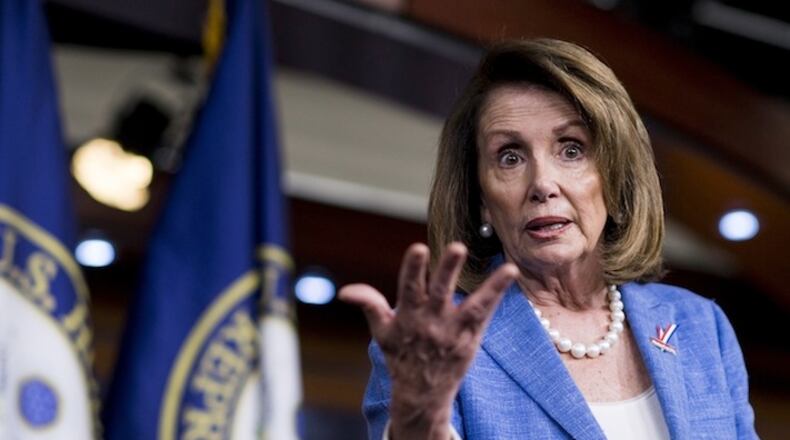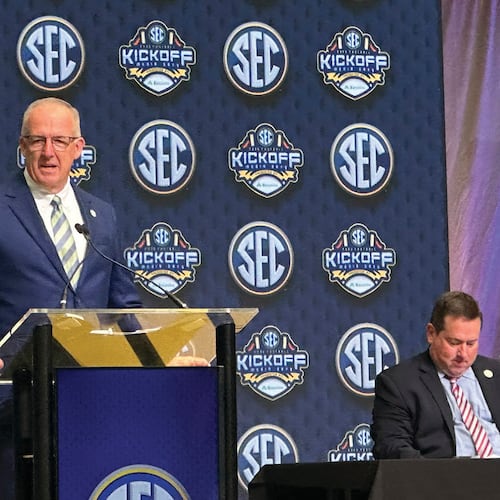Nancy Pelosi boasted last week she was "worth the trouble," even when congressional candidates were negatively tied to her, the National Republican Campaign Committee ironically sang its own praises for the House minority leader.
"We couldn't agree more!" was all an email blast read that included a clip of Pelosi's point of view.
That came the same day President Donald Trump tweeted he hoped Democrats "do not force Nancy P out" because it would be "very bad for the Republican Party."
The notion of GOP campaigns using Pelosi's unpopularity to motivate their base — and, as a result, thanking her for helping them win elections — is a tactic that has developed over a decade and half of her being in congressional leadership.
But for the first time in a decade, there is no Hillary Clinton in the spotlight or a Barack Obama White House, leaving Pelosi as one of the most well-known members of the party with unobstructed exposure to negative campaign rhetoric going into 2018 midterms.
Without a Democrat in the White House to be at the center of the GOP's ire, Pelosi has already been used in political ads in at least two of this year's four special elections for Republican-held seats.
Also on the same day as Pelosi's comments last week, the NRCC launched a video it dubbed "Thank you, Nancy Pelosi" in which the voiceover boasts of Democrats losing those four races. (A fifth special election, to replace California Democrat Xavier Becerra, yielded a Democratic victory when Jimmy Gomez won that contest.)
"Thank you for your support of failed candidates," the ad says in an upbeat tone. "Thank you for continuing to fail as your party's leader."
A senior aide for Pelosi, Drew Hammill, said the tactic to tie the California Democrat to candidates represents more of the same from several years past and that other Democratic congressional leaders have received the same treatment.
"This is what their strategy is," Hammill said, adding that instead of policy, Republicans use an anti-Pelosi message to focus on "personal destruction."
But Pelosi also faces discord among at least a dozen members of her own caucus itching for a change in leadership after failing to gain a chamber majority in four straight national elections.
None of that seemed to faze Pelosi. Instead, she welcomed the challenge, highlighted her accomplishments, and defended why she ought to stay in her post.
"So you want me to sing my praises, is that what you're saying?" Pelosi said with a laugh about staying on as leader. "I'm a master legislator. I am a strategic, politically astute leader. My leadership is recognized by many around the country and that is why I am able to attract the support that I do."
She even defended her appearance in negative ads that tie her to congressional Democratic candidates.
In one ad, Jon Ossoff, the unsuccessful Democratic candidate in the Georgia special election last week, was depicted as being "on her side." The video encouraged people to vote Republican and "say no to Pelosi's yes man."
"Whoever the leader is, is going to be their target if the leader is effective," Pelosi said.
Members of the Democratic caucus agree that Pelosi will have less cover going into 2018. Still, they are hesitant to turn the caucus on itself over her leadership.
"No question about it," said Arizona Rep. Raul M. Grijalva about the focus on Pelosi in campaign ads. "She's the highest-profile Democrat."
Grijalva, who co-chairs the Congressional Progressive Caucus, said Democrats' strategy should be focused on attacking the Republican agenda in return, "not at creating our own little soap opera here."
Ohio Rep. Tim Ryan, who ran against Pelosi for her leadership post in November, said he once had a political ad on a billboard targeting him in his district that featured Obama, Pelosi and former Senate Minority Leader Harry Reid "with me as a dog with a leash around my neck."
"Clearly with President Obama gone, she becomes the sole focus," Ryan said.
NRCC Chairman Steve Stivers said there wasn't a particular concerted effort to use Pelosi to the GOP's advantage, though ads in Montana and Georgia featured the California Democrat this year.
The Pelosi attack ads were mostly funded by the Congressional Leadership Fund, a super PAC tied to House GOP leadership.
"Elections are choices and voters need to be informed about what direction those choices mean for the country, for their area," Stivers said. "Our ads in Georgia were intended to make sure our voters got out and voted and they did."
Rep. Cedric L. Richmond, who attended a meeting last week of Democratic members who discussed how to replace Pelosi, said one way to combat the negativity is to actually defend her.
"We can't run from the fact that she's our leader. We can't run from her record," said the Louisiana Democrat, who chairs the Congressional Black Caucus. "Maybe instead of just completely running, maybe we turn around and fight."
Ohio Democrat Marcia L. Fudge, who supported Ryan's bid for Democratic leader, said what she is seeing is more of the same.
"She was the top target with a Clinton and Obama," Fudge said. "I don't think that there's anything changed. I think what has changed is the political climate in this country and it is much more negative and nasty."
Pelosi, for now, does not appear to be going anywhere though she told reporters earlier this year she would have ended her career in Congress had Clinton won the presidency.
Pelosi also blew off her dissenters calling for her to step down to allow for new leadership.
"My decision about how long I stay is not up to them," she said.
About the Author
The Latest
Featured


